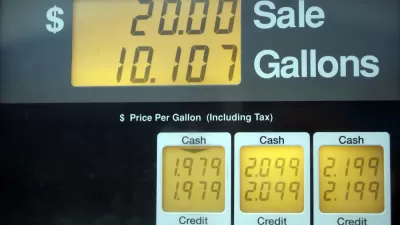Delaware and Pennsylvania will join a small, select number of western states that have explored technology to charge drivers by the miles they drive, not the fuel they burn, to fill their transportation budgets in lieu of fuel taxes.
The I-95 Corridor Coalition, which includes the state departments of transportation of all 16 states and the District of Columbia along the Eastern Seaboard, will launch a a three-month pilot program of a mileage-based user fee (MBUF), also referred to as a road usage charge or vehicle-miles-traveled (VMT) fee, next year. The project was one of eight selected by the U.S. Department of Transportation in August last year to explore ways to transition from the gas tax to other user-based revenue mechanisms to fund transportation infrastructure.
One of the major issues that the three-month pilot, which will consist of only 50 vehicles, will explore is the interoperability with existing toll facilities which are far more prevalent on the East Coast than in Oregon, which has the nation's only ongoing road usage charge program (OReGO) that began in July 2015, or than in California, which launched its 9-month pilot a year later, although express or HOT lanes are popular. The coalition also includes the major toll and turnpike agencies on the East Coast.
Colorado, Washington and Hawaii have explored, or will explore road usage charges. All five states are members of RUC West, aka Western Road Usage Charge Consortium.
The pilot will also "address privacy concerns and potential solutions to account for how many miles are driven by out-of-state drivers, and how payments would be transferred from one state to another," reports Max Smith for WTOP Radio. The project, which will be run by CH2M Hill, consists of more than the pilot.
The $1.16-million project is set to include lobbying and public relations efforts to convince drivers, transportation officials and others, that the gas tax will not provide the money needed for major maintenance and repairs over the long term, especially as vehicles get more fuel efficient.
Unlike the Oregon and California programs, no state legislation is behind the I-95 Coalition project. Mileage fees can be very controversial, regardless of party affiliation.
“We’re not endorsing this … but we want to make sure we explore it,” Executive Director Patricia Hendren said.
Connecticut's DOT joined the 5-state application on behalf of the corridor over the objections of Republican and Democratic legislators who oppose any increase in driving fees. Republican Gov. Charlie Baker prevented Massachusetts from participating in the pilot program.
"If that goes well, and the coalition is awarded another federal grant focused on testing new ways to fund road maintenance and repairs, a true pilot program would begin including members of the general public," adds Smith.
A larger pilot gets into how we address pretty sticky issues,” Hendren said. “Like privacy, technology, and crossing state lines — basically what something like this would really look like in practice.”
According to CH2M Hill, the project will be overseen by the "I-95 Corridor Coalition MBUF Steering Committee, comprised of representatives from the participating states, including staff from the respective Departments of Transportation, DMVs and finance agencies, along with other key stakeholders from the tolling industry, trucking industry and AAA to find a future-proof solution to fund transportation improvements."
Smith had also reported in February 2016 on a Congressional Budget Office report [pdf] that recognized the economic benefits of charging road tolls or VMT fees in the face of declining gas tax revenues. From the report's summary:
Drivers Could Be Charged for Their Highway Use
Charging drivers specifically for using roads would increase economic output by allowing highly valued transportation to move more quickly and more reliably. Such pricing could take the form of per-mile charges (also known as vehicle-miles traveled, or VMT, charges), congestion charges, or tolls on Interstate highways.
Hat tip to Los Angeles Metro Transportation Headlines.
FULL STORY: East Coast looks at charging drivers per mile

Planetizen Federal Action Tracker
A weekly monitor of how Trump’s orders and actions are impacting planners and planning in America.

Restaurant Patios Were a Pandemic Win — Why Were They so Hard to Keep?
Social distancing requirements and changes in travel patterns prompted cities to pilot new uses for street and sidewalk space. Then it got complicated.

Map: Where Senate Republicans Want to Sell Your Public Lands
For public land advocates, the Senate Republicans’ proposal to sell millions of acres of public land in the West is “the biggest fight of their careers.”

Maui's Vacation Rental Debate Turns Ugly
Verbal attacks, misinformation campaigns and fistfights plague a high-stakes debate to convert thousands of vacation rentals into long-term housing.

San Francisco Suspends Traffic Calming Amidst Record Deaths
Citing “a challenging fiscal landscape,” the city will cease the program on the heels of 42 traffic deaths, including 24 pedestrians.

California Homeless Arrests, Citations Spike After Ruling
An investigation reveals that anti-homeless actions increased up to 500% after Grants Pass v. Johnson — even in cities claiming no policy change.
Urban Design for Planners 1: Software Tools
This six-course series explores essential urban design concepts using open source software and equips planners with the tools they need to participate fully in the urban design process.
Planning for Universal Design
Learn the tools for implementing Universal Design in planning regulations.
Heyer Gruel & Associates PA
JM Goldson LLC
Custer County Colorado
City of Camden Redevelopment Agency
City of Astoria
Transportation Research & Education Center (TREC) at Portland State University
Camden Redevelopment Agency
City of Claremont
Municipality of Princeton (NJ)



























